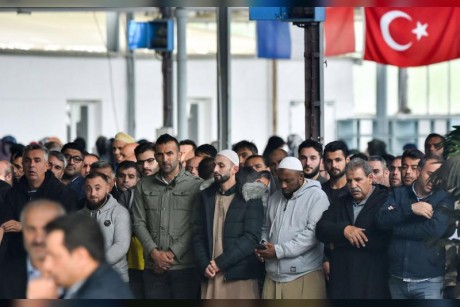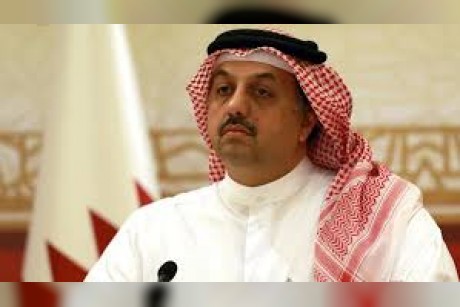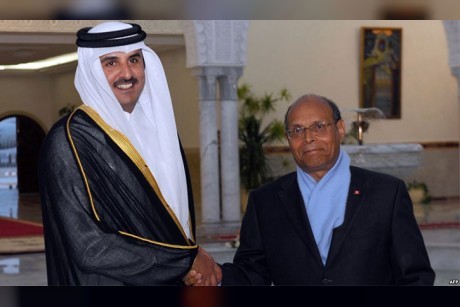French newspaper Le Point asked, after the first Gulf War in 1991: “What’s left of France’s Arab policy?” to which Michel Jobert retorted: “Barbes-Rochechouart.”
As illustrated by Jobert’s response, France's policy towards the Arab world was reduced to the management of a Parisian neighbourhood, symbolising the resignation of the country and the failure of its policies towards immigration and Islam.
Jobert was one of the first Gaullist political figures. Minister of Foreign Affairs under Georges Pompidou (1973-74) and State Secretary for Foreign Trade (1981-83) under Francois Mitterrand, Jobert is considered one of the main architects of France’s Arab policy.
Jobert was the first French politician to recognise the significance of France’s abandonment of its Arab policy, when one of his successors, socialist Roland Dumas, sounded its death knell around the beginning of the first Gulf War.
Does France no longer have a comprehensive Arab policy? Does it only have a transactional policy based on arms sales in particular?
Since the Arab world imploded in upheaval, major world powers, including France, ceased to wield a coherent policy towards the region. With the collapse of the Soviet Union and the corollary end of the Yalta Conference, the United States rose above the ruins of bipolarism to emerge as the sole major world power.
Mitterrand understood this and considered it dangerous to oppose this war that would have serious repercussions on French internal affairs. He confided to Nouvel Observateur’s Josette Alia that US President George H.W. Bush was determined to wage this war and that Mitterrand will not be able to oppose it.
He then quipped: “As for the Arabs, they will eventually forget.”
It was a fatal error of judgment. What had eluded Mitterrand was the explosive psychological effect this neocolonial war would have on the French front and particularly on the Muslims in France.
Occurring during the war in Afghanistan and at a time when civil war was looming in Algeria, this conflict, in which France had intervened directly, can be considered the starting point of the malaise among the Muslims of France.
In the face of hostile and biased media coverage devoid of nuance of the events, Muslims felt they counted for nothing or even were considered “inside enemies.”
This identity and ideological divide, on top of another social divide and the failure of the integration model because of a lack of resources and political will, created the rise of communitarianism and its corollary, radical Islamism and even terrorism.
French authorities allowed the situation in the suburbs to rot and appeared, by negligence and blindness, to be complacent, if not complicit, with the most obscurantist currents indoctrinating French Muslim citizens.
Starting from a false premise that political Islam is the only current representative of Islam, bringing changes in the Arab world and in the Muslim community of France, successive governments in Paris, both on the left and on the right of the political spectrum, fell into the trap of political Islam and helped to hand over the suburbs to communalist societies and associations affiliated with the Muslim Brotherhood and financed mainly by Turkey and Qatar.
Those two countries, the major sponsors of the Muslim Brotherhood and political Islam, are doing an effective and dangerous proselytising job, taking advantage on one side of the failure of the French model of integration and, on the other side, of the total lack of involvement on the part of the countries of origin of those communities, mainly Maghreb countries, and of the abandonment of their past policy of supervision.
Practically at the same time, especially after the dissolution of the National Liberation Front in Algeria and the introduction of multiparty politics after 1988, Algeria, whose community is the largest in France, ceased to follow up on and supervise its former citizens so neighbourhood associations took over the task and those were often infiltrated by Islamists or pro-Berber activists.
Islamists in France were courted and financially and ideologically supported by Wahhabi currents of Islam in the 1970s and 1990s. They will be relayed by the Muslim Brotherhood, funded and controlled by Qatar and Turkey.
If Turkey, especially after the seizure of power by the Islamist Justice and Development Party in 2002, could count on a substantial Turkish community in Europe, many of whom were either subjugated or blackmailed by the new power in Ankara, this was not the case of Qatar which, from the 2000s, became a disruptive and harmful element in France’s Muslim community.
To satisfy its excessive ambition to control this community, right under the nose of the Maghreb countries and Egypt, Qatar resorted to its chequebook, deployed unprecedented media coverage through Al Jazeera and sent Muslim Brotherhood activists.
The latter, cajoled by the West which welcomed them and saw them as “freedom fighters,” to use Ronald Reagan’s famous label about the future terrorists of al-Qaeda, infiltrated the main Islamic organisations that claimed to be representative of the Muslims of France.
It should be pointed out that it is the Union of Islamic Organisations in Europe or the Federation of Islamic Organisations in Europe, created by the Muslim Brotherhood, which were at the creation of the Union of Islamic Organisations in France (now Muslims of France), a disputed and contestable organisation whose representativeness is openly rejected by most Muslims. It was this organisation that invited to France dubious or dangerous Islamist figures such as Yusuf al-Qaradawi, now banned from entering France.
Worried about complacency shown towards the Muslim Brotherhood, especially since the election of Nicolas Sarkozy as president in 2007, many politicians and intellectuals in France sounded the alarm but it wasn’t to be. With the tsunami that blew over the Arab world in 2011, and amplified by Qatari media, collusion with Qatar has increased.
The first serious investigation into this collusion between French politicians and Qatar, written by Jacques-Marie Bourget and Nicolas Beau, was published in 2013 under the evocative title: “The Little Villain of Qatar, a Friend Who Wants Us Harm”.
That work led to other investigations, including “When Qatar Transforms Our Country Into Its Playground” by Vanessa Ratignier and Pierre Pean published one year after the first book.
The latest of this series of damning investigations was published this year by two French specialists of the Arab world — Christian Chesnot from France Inter and Georges Malbrunot from Le Figaro — under the title “Qatar Papers: How the Emirate Finances the Islam of France and Europe”.
There was some hope that a break with the Islamists was imminent and the prospect of criminalising the organisation of the Muslim Brotherhood was discussed. Some opposition parties in France — the Republicans and the former National Front — and in the United Kingdom, formerly a stronghold for Islamists, suggested its ban, like it was done by the United States.
Could these announcements be mere declarations of intention to calm a French public opinion traumatised by terrorist attacks that had fallen on France since 2015 or could they be the beginning of a real break with the past?
Entangled in the management of the crisis created by the Yellow Vests movement, French president Emmanuel Macron strongly stigmatised the Muslim Brotherhood but did not openly name it. He simply attacked those who “in the name of a religion pursue a political project, that of a political Islam that wants to divide our republic.”



